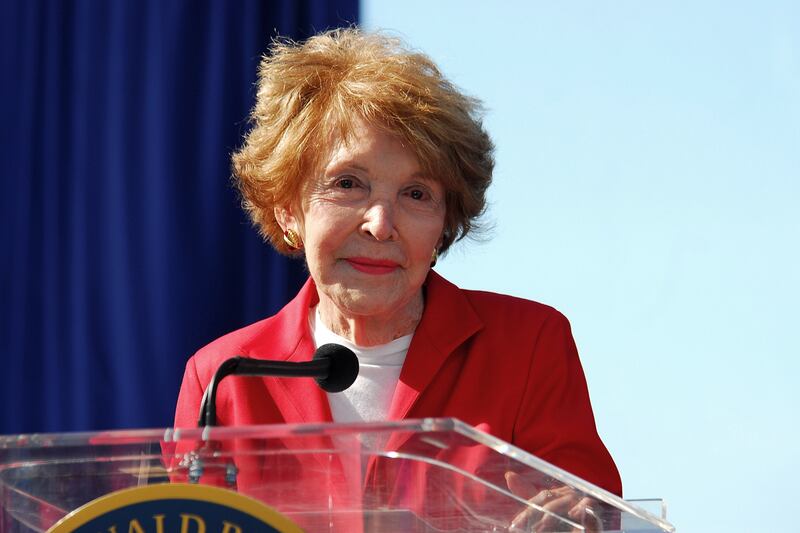As an aspiring actress in Hollywood, Nancy Davis shaved two years off her age, claiming July 6, 1923, when she was born in 1921. A woman being coy about her age is not uncommon, and the truth didn’t come out until the onetime actress was in the White House as first lady. “I told a little fib,” she said.
Not that she minds anymore that well wishers are keeping count. Reagan turns 90 on Wednesday, a milestone to celebrate as much for the life she has lived as her longevity. She’ll mark the day by attending a luncheon in her honor at the home of a longtime friend, Ruth Jones, whose husband headed Northrup Corp. and whose birthday lunch for Nancy is an annual affair.
Friends who were with her at the events surrounding the 100th anniversary of Ronald Reagan’s birth earlier this year say that she appears increasingly frail since she broke her pelvis in a fall in October 2008. But her spirit remains indomitable. She relies on a cane but gamely took the stage at the Reagan Library, moving very slowly but with the kind of focus and determination that sustained her through the White House years, and then her husband’s decade-long battle with Alzheimer’s.
ADVERTISEMENT
Looking back on the various stages of Nancy Reagan’s life, Carl Anthony, the author of a dozen books about presidential wives and families, finds what he calls “an arc of grace” that has brought her to a very different place in the American imagination than the shallow “Queen Nancy” the public initially saw when she came to Washington wearing designer clothes and wanting new china for the White House.
The 1980s were the full flush of the women’s movement, and Nancy was seen as an anti-feminist, even though there was a time when she lived alone and supported herself as an actress. Once she married her beloved Ronnie, she became the quintessential wife and mother, but it wasn’t all storybook. Her two children rebelled against their father and his conservative politics, and there were tensions with the children from his first marriage, commonplace problems but painful when they’re played out in public.

In the White House, says Anthony, Reagan felt a bit besieged by life—the death of her mother and the adoptive father she adored, her husband’s cancer, then her cancer, the public estrangement with Michael Reagan and Patti Davis—and above all the assassination attempt that left her so worried about her husband’s safety that she sought solace in astrology.
The public role of first lady did not come easily to Nancy, and it was more than a year into her husband’s presidency before she successfully recast her image with a winning performance as “Second Hand Rose” at a Gridiron Dinner with reporters, followed by the launch of her “Just Say No” anti-drug campaign.
But that was mostly window-dressing. Nancy Reagan is first and foremost remembered for how she fiercely protected her husband. Reporters made fun of the “Nancy gaze” she fixed on him in public, but as more became known about how she looked after his well-being politically and substantively in the White House, and then through a decade of illness that robbed him of his memory, she was increasingly viewed as a heroic figure.
“She’s very much like Jackie Kennedy,” says Anthony. “She really felt and continues to feel a responsibility for her husband’s legacy and the library. Hillary Clinton or Barbara Bush or women like Eleanor Roosevelt share that responsibility but don’t assume it as a primary caretaker. Mrs Reagan does, and I think it sustains her.”
Reagan has lived a life of both great privilege and enormous responsibility, and while she would never call herself a feminist, she stood up on enough issues to make the sisterhood proud. She was not always in sync with her party on social issues, and after leaving the White House she worked with Ted Kennedy to win support for stem-cell research. When Kennedy died, she lamented the passing of “an ally and a dear friend,” and noted that given their political differences, “people are sometimes surprised by how close Ronnie and I have been to the Kennedy family. But Ronnie and Ted could always find common ground, and they had great respect for one another.”
The liberal lion and the conservative icon are gone, but the lesson they leave is embodied in Nancy Reagan, who at 90, serves as a reminder that political differences are fleeting, legacy is forever, and bridging the two is what endures over time.





